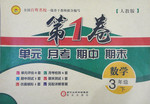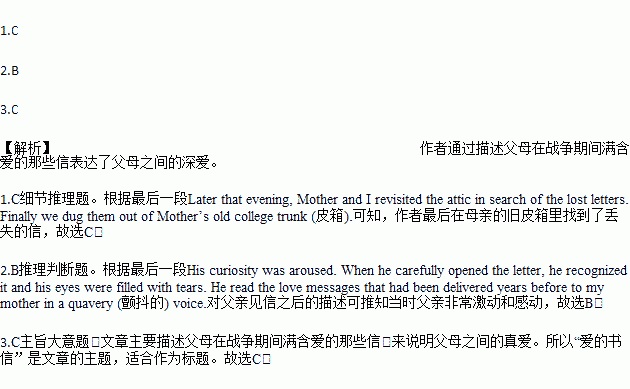题目内容
This past Christmas season, I went to visit my parents. During the visit, I found the letters written by my parents to each other during the war in the attic (阁楼). The letters were piled high, dirty and had not been touched for decades. I asked mother and father if I could take the letters back to my home. They agreed.
As I opened each letter, all of them beautiful with age, I discovered a new page in this private part of my parents' lives. My father served in the army. His letters were full of frontline (前线) descriptions, and they continued all the way through the battle. Each of my mother's letters was sealed (密封) with her lipstick kiss. Father wrote that he sealed his return letters by rekissing her lipstick kiss. How they had been missing each other! I finished reading six months of the letters and discovered there were at least eleven months missing. Maybe they were lost forever.
Not long after our Christmas visit, Father became very ill and was in hospital. I went to the hospital to see him. As I sat by his bedside, he told me how much receiving those lipstick-kissed letters had meant to him when he had been so far from home.
Later that evening, Mother and I revisited the attic in search of the lost letters. Finally we dug them out of Mother’s old college trunk (皮箱). The next day was Valentine’s Day, and we went to the hospital. At my father's bedside, I showed him an old envelope. His curiosity was aroused. When he carefully opened the letter, he recognized it and his eyes were filled with tears. He read the love messages that had been delivered years before to my mother in a quavery (颤抖的) voice. This Valentine’s Day, we were lucky that we had everything.
1.Where did the writer find the missing letters?
A. In the hospital. B. At her father's bedside.
C. In a trunk. D. In her own house.
2.How did the writer’s father feel when he saw the letter?
A. Curious. B. Touched.
C. Regretful. D. Interested.
3.What would be the best title for the passage?
A. Christmas Gift B. My Parents
C. Love letters D. The Good Old Days
 第1卷单元月考期中期末系列答案
第1卷单元月考期中期末系列答案

 out C. look through D. write down
out C. look through D. write down